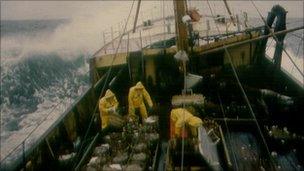Fish quota trade plans slammed by environment secretary
- Published

The proposed reforms suggest switching to quota systems based on how many fish are landed in port
Scotland's environment secretary has attacked draft proposals by the European Commission to introduce quota trading between member states.
Richard Lochhead said the introduction of internationally tradeable Individual Transferable Quotas (ITQs) could spell the end for Scots fishing communities.
He argued the move effectively privatised Scotland's fisheries.
The commission will issue a proposal on reforming the Common Fisheries Policy (CFP), external in July, to take effect in 2013.
A central plank of the proposed reforms is to eliminate discards, by switching to quota systems based on how many fish are landed in port rather than how many are caught.
Up to half the catch of some species has to be discarded because vessels have exceeded their quota, or because the fish are undersized.
The draft proposal envisages phasing in a complete discard ban, obliging vessels to "record and land" all catches.
The draft proposal suggests the mandatory adoption of ITQs "for all fishing vessels of 12m [39ft] or more... and for all fishing vessels under 12m length fishing with towed gear [such as trawls]."
Skippers would be guaranteed shares of national quotas for periods of at least 15 years, which they could trade among themselves - even, if the national government agrees, trading with fleets from other countries.
But Mr Lochhead said it was "a very dangerous proposal that rears its ugly head from time to time" in the European Commission.
He continued: "The introduction of quota trading between member states could spell the end for many, if not all, of Scotland's fishing communities.
"Any form of quota trading leads to consolidation, as those with the deepest pockets win out.
"The idea that a national resource such as fish stocks could be sold to other countries, effectively privatising our fisheries, would leave foreign based multi-nationals laughing all the way to the bank and mean that over time our own fishing communities would not be able to catch the rich stocks in Scottish waters."
Mr Lochhead said the danger posed by ITQs showed decisions over fishing policy must be returned to member states, and not left in the hands of "out-of-touch Brussels bureaucrats that have caused many of the problems our fishermen are already having to cope with day in, day out".
He added: "The reform of EU fisheries policy should be about saving our fish stocks and fishing communities, not about making matters even worse for a proud fishing nation like Scotland."
Following publication of the final version of the proposals in July, there is likely to be strident debate in Europe before the reform package is agreed in 2013.
- Published12 May 2011
- Published12 April 2011
- Published1 March 2011
- Published5 December 2010